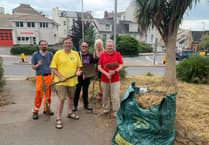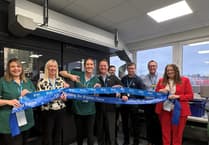MOVING stories of lifesaving treatment have galvanised efforts to save a vital emergency services collaboration that is in danger of being replaced.
Residents revealed how firefighters, acting in their capacity as medical emergency co-responders, had saved significant numbers of lives due to their ability to reach people in need before ambulances.
The county’s ambulance service decided earlier this year to try and replace the scheme with volunteer community first responders, but stressed in a two-hour grilling by Devon County Council members that the fire service cohort would only be disbanded if enough volunteers can be recruited.
The strength of feeling from the public and members of Devon County Council’s health and adult care committee, meant the ambulance service was requested to provide more data to support its rationale and return to present its findings in September.
The committee voted to request the ambulance service pauses the implementation of any changes and that it provides a report with further data addressing various concerns.
Trudy Bowles, practice manager at Hartland GP surgery in North Devon, said fire co-responders had saved her husband Mark’s life in 2010 after he suffered a cardiac arrest.
Their care meant he was kept stable enough until further help arrived, and he was transferred to intensive care where he remained for two months.
‘The fire co-responders sustained Mike long enough to ensure he got the critical treatment he needed,’ she said.
‘Mike passed in December 2023, but because of those three remarkable and highly trained fire co-responders, he was given the chance to see his daughter married, meet his grandson, and have 13 years more of marriage.'
Mark Nesbitt, who spent 15 years in the fire co-responder team in Hartland, said during the 25 years, it had attended about 1,000 casualties on behalf of the ambulance service.
‘We are trained by the ambulance service and carry their pagers and we are on call all the time,’ he said.
‘We go in teams of two and we are blue-light trained, so we provide the fastest response in fully-equipped vehicles.’
Mr Nesbitt added he had attended category 1 incidents – the most serious medical emergencies – at pubs, village halls, holiday cottages where the caller is completely unfamiliar with the area, beaches, farms and at doctors surgeries.
‘The ambulance service might save a few pounds [by removing the fire co-responders], but the long-term cost of life-changing patient outcomes will be far greater,’ he warned.
Most tragic was the tale relayed by Penny Dane on behalf of a Devon family, whose daughter awoke one night in 2020 to find her fiance, Trevor, unconscious and not breathing.
In spite of the best efforts of the daughter’s family to perform lifesaving treatment with the support of ambulance staff down the phone, the wait of around 40 minutes for paramedics to arrive led to Trevor needing to live in a specialist home, requiring 24-hour care, and being unable to speak or communicate. He still lives there today.
Members of the health and adult care scrutiny committee claimed they felt the ambulance service was over-relying on the issue of cost in terms of making its decision.
Fire co-responders, who are present at 15 Devon fire stations, cost £80 per deployment, whereas their voluntary peers only cost about £20 per time.
Co-responders are deployed by the ambulance service when it cannot respond as quickly as it would like or when the circumstances require the fastest response.
Councillor Jess Bailey (Independent, Otter Valley) said she had summoned the South Western Ambulance Service Trust (SWAST) boss, Dr John Martin, to explain why he wanted to terminate the 30-year fire co-responder agreement.
She had been handed two petitions with 5,400 signatures opposing any change, and asked why his organisation wanted to ‘take away a vital lifeline that costs so little and means so much’.
Dr Martin said community first responders were ‘highly trained, reliable and fast’, and while it was less expensive to use volunteers, he claimed the service’s core concern was speed because of the serious emergencies co-responders are despatched to.
‘Who can get their quickest is most important as we know for the best survival [for category 1 incidents like cardiac arrests], you need someone there as quickly as possible to perform CPR and use a defibrillator,’ he said.
‘We will send more than one community first responder to a cardiac arrest where available, and our data shows that cohort responds quicker.’
Concerns were raised about whether community co-responders would have the necessary equipment, whether there would always be more than one of them present, and what assessment would be done to ensure their ability to perform the role.
Dr Martin assured attendees at the meeting that the service would be robust, but repeatedly stressed no fire co-responder scheme would be stopped unless the ambulance service could recruit enough volunteers in an area.
In the 12 months to the end of June, Devon’s 81 fore co-responders attended 1,025 patients in cases where the ambulance service despatched them because it couldn’t reach them fast enough.
Gavin Ellis, chief fire officer for Devon and Somerset Fire and Rescue Service, said members of his staff that worked as co-responders took pride in the role, and any efforts to get those firefighters to become community first responders would need to be carefully considered in case of implications on fire cover.
Cllr Bailey ended the meeting by stating she wanted the ambulance service to do more work.
'I don’t feel, based on what we have heard today and the information provided, confident that it is a sound basis for terminating the current arrangement, and think we should be looking for more information, assurance and facts,’ she said.
‘We know our ambulance response times are one of the slowest in the country so it seems concerning we have a potential change that could put lives at risk without all the facts about how it can be benchmarked against other areas and how it presents a safe option.’


.png?width=209&height=140&crop=209:145,smart&quality=75)


Comments
This article has no comments yet. Be the first to leave a comment.